Myriad Canada and the Madiro Foundation: Partnering to Improve Access to Healthcare in East Africa
In 2021, Myriad Canada began an exciting partnership with Madiro, in collaboration with the Gillian and Adrian Schauer Foundation, supporting innovation to improve the health of vulnerable communities. With a deep commitment to health equity for the world’s most vulnerable populations, they work on high-impact projects that will save lives, reduce suffering and promote well-being.
Thanks to this partnership, five new charitable projects will be implemented in East Africa, where many people live in remote and rural areas with limited access to health care.
We are pleased to present these five exciting projects and partner organizations!
EMPOWERING ACCESS TO HEALTHCARE IN UGANDA WITH HEALTHY ENTREPRENEURS
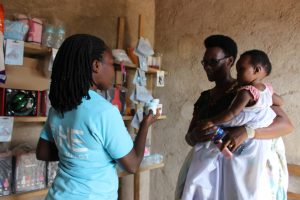 Healthy Entrepreneurs, an organization based in the Netherlands, recognizes the potential of training local people in basic healthcare for them to become Community Health Workers (CHWs).
Healthy Entrepreneurs, an organization based in the Netherlands, recognizes the potential of training local people in basic healthcare for them to become Community Health Workers (CHWs).
Investing in CHWs can prevent millions of deaths per year. People become healthier, live longer and are more capable of working and contributing to the local and national economy. The intervention of CHWs can decrease the burden on health centres and hospitals, reduce costs and identify, diagnose and treat illnesses earlier. Its social impact is also broadly recognized, such as with the development of children and the empowerment of women.
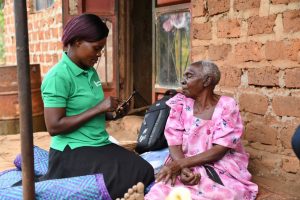 Healthy Entrepreneurs believes that local entrepreneurship is an important part of the solution. Their model offers the CHWs – many of whom are women – training on health and business skills, a reliable income stream and opportunities for career growth. The services and products they offer provide individuals and households access to basic health care for easily treatable or preventable conditions like malaria, parasites and pneumonia
Healthy Entrepreneurs believes that local entrepreneurship is an important part of the solution. Their model offers the CHWs – many of whom are women – training on health and business skills, a reliable income stream and opportunities for career growth. The services and products they offer provide individuals and households access to basic health care for easily treatable or preventable conditions like malaria, parasites and pneumonia
This project will train 225 new CHWs who will provide basic healthcare services and products to 56,350 families in a remote and isolated area in Uganda.
SEXUAL REPRODUCTIVE HEALTH & RIGHTS EDUCATION FOR ADOLESCENTS IN THE GAMBIA
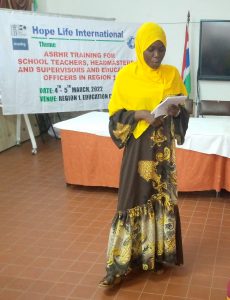
In the vulnerable neighbourhoods of Kanifing Municipal Council, high unemployment, overcrowding, low education rates and social inequalities are just some of the issues contributing to a lack of access to sexual health and reproduction education and services – and increasing problems with teenage 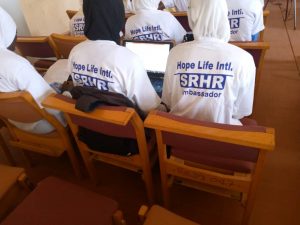 pregnancy, date rape and STIs & HIV/AIDS.
pregnancy, date rape and STIs & HIV/AIDS.
Hope Life International, a small NGO in the Gambia, understands that these challenges must be addressed in a holistic way, one that involves and engages multiple stakeholders in the community, including parents, schools and community and religious leaders.
This project aims to give adolescents informed control over their reproductive health by supporting and educating vulnerable in-school adolescents on sexual reproductive health & rights and HIV/AIDS and educating and engaging community leaders and education professionals in support of SRHR education in schools.
MENTAL HEALTH OF VULNERABLE INDIVIDUALS IN UGANDA
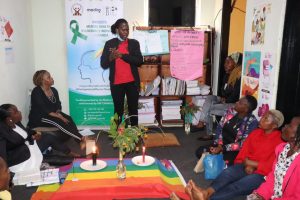 Uganda’s seriously underfunded mental health services pose a serious
Uganda’s seriously underfunded mental health services pose a serious 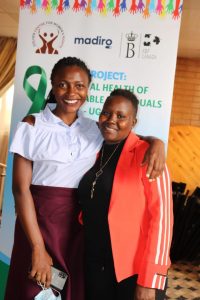 problem. While everyone is susceptible to mental health issues, young women, women in the LGBTQ community, women refugees and sex workers are the most at risk. In Uganda, homosexuality is not only religiously and culturally unacceptable, it is illegal, fuelling acts of violence towards LGBTQ individuals from both society and state actors. High HIV/STI transmission, inadequacy of healthcare and psychological support, unlawful arrests and discrimination all result in high levels of trauma.
problem. While everyone is susceptible to mental health issues, young women, women in the LGBTQ community, women refugees and sex workers are the most at risk. In Uganda, homosexuality is not only religiously and culturally unacceptable, it is illegal, fuelling acts of violence towards LGBTQ individuals from both society and state actors. High HIV/STI transmission, inadequacy of healthcare and psychological support, unlawful arrests and discrimination all result in high levels of trauma.
The Golden Centre for Women’s Rights is a small NGO in Uganda that works to promote and protect the health, economic and social rights of vulnerable women. The goal of this project is to protect the mental health of some 250 vulnerable women, adolescents and non-binary individuals in the LGBTQ community through awareness raising, support and education.
HIV MANAGEMENT FOR AT-RISK INDIVIDUALS IN SOUTH SUDAN
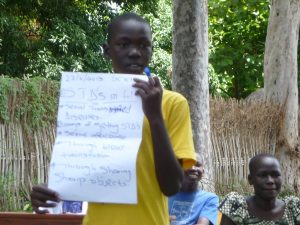 Years of conflict and human displacements in South Sudan has resulted in ongoing disruption in the country’s HIV response and access to services. Out of the 200,000+ people estimated to be living with HIV, most are not aware of their HIV status, and only 18% are on antiretroviral therapy.
Years of conflict and human displacements in South Sudan has resulted in ongoing disruption in the country’s HIV response and access to services. Out of the 200,000+ people estimated to be living with HIV, most are not aware of their HIV status, and only 18% are on antiretroviral therapy.
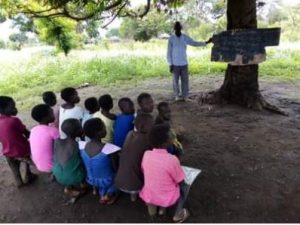 There is an urgent need to expand access to HIV prevention, care and treatment services. This includes increasing the proportion of all people living with HIV (PLHIV) who are aware their HIV status and who initiate and remain on antiretroviral therapy in order to achieve viral suppression.
There is an urgent need to expand access to HIV prevention, care and treatment services. This includes increasing the proportion of all people living with HIV (PLHIV) who are aware their HIV status and who initiate and remain on antiretroviral therapy in order to achieve viral suppression.
The South Sudan Community Change Agency (SOSUCCA) is a small NGO that helps empower and build the capacity of communities through providing support on issues that impacting them. Through implementing targeted testing, tracking and support, this project aims to reach over 2,500 at risk individuals (eg sex workers, truck drivers, youth, partners of PLHIV etc) who will know their HIV status and attain viral suppression for 95% through enrolment in and retention to HIV treatment.
ENHANCING COMMUNITY MENTAL HEALTH SERVICES IN KENYA
In Kenya, lack of resources for mental health care is a critical problem, and discrimination against people suffering from mentally health problems is deeply entrenched. Many families have nowhere to turn for help and resort to unimaginable measures such as hiding and even chaining suffering family members away from the eyes of a society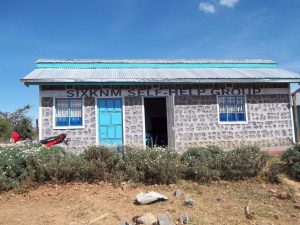 that would rather pretend they don’t exist.
that would rather pretend they don’t exist.
SIXKNM Self Help Group works to improve the lives of people living and struggling with physical and mental health illnesses. This project will identify and train local Community Health Volunteers (CHVs) to provide urgently needed basic support to 3,000 individuals (and their families) living with mental illness. The CHVs will work under the supervision of trained staff who will liaise regularly with the health-care system. Follow-up visits will be made and those requiring additional support will be referred to the next level of the health-care system, reducing potentially risky treatment gaps.
The project will also train community members such as teachers and traditional and religious leaders to mainstream mental health issues in their activities, and work towards the integration of community mental health services into existing primary health care.

